Daixuan Cheng
SWE-Master: Unleashing the Potential of Software Engineering Agents via Post-Training
Feb 03, 2026Abstract:In this technical report, we present SWE-Master, an open-source and fully reproducible post-training framework for building effective software engineering agents. SWE-Master systematically explores the complete agent development pipeline, including teacher-trajectory synthesis and data curation, long-horizon SFT, RL with real execution feedback, and inference framework design. Starting from an open-source base model with limited initial SWE capability, SWE-Master demonstrates how systematical optimization method can elicit strong long-horizon SWE task solving abilities. We evaluate SWE-Master on SWE-bench Verified, a standard benchmark for realistic software engineering tasks. Under identical experimental settings, our approach achieves a resolve rate of 61.4\% with Qwen2.5-Coder-32B, substantially outperforming existing open-source baselines. By further incorporating test-time scaling~(TTS) with LLM-based environment feedback, SWE-Master reaches 70.8\% at TTS@8, demonstrating a strong performance potential. SWE-Master provides a practical and transparent foundation for advancing reproducible research on software engineering agents. The code is available at https://github.com/RUCAIBox/SWE-Master.
LLM-in-Sandbox Elicits General Agentic Intelligence
Jan 22, 2026Abstract:We introduce LLM-in-Sandbox, enabling LLMs to explore within a code sandbox (i.e., a virtual computer), to elicit general intelligence in non-code domains. We first demonstrate that strong LLMs, without additional training, exhibit generalization capabilities to leverage the code sandbox for non-code tasks. For example, LLMs spontaneously access external resources to acquire new knowledge, leverage the file system to handle long contexts, and execute scripts to satisfy formatting requirements. We further show that these agentic capabilities can be enhanced through LLM-in-Sandbox Reinforcement Learning (LLM-in-Sandbox-RL), which uses only non-agentic data to train models for sandbox exploration. Experiments demonstrate that LLM-in-Sandbox, in both training-free and post-trained settings, achieves robust generalization spanning mathematics, physics, chemistry, biomedicine, long-context understanding, and instruction following. Finally, we analyze LLM-in-Sandbox's efficiency from computational and system perspectives, and open-source it as a Python package to facilitate real-world deployment.
FlowRL: Matching Reward Distributions for LLM Reasoning
Sep 18, 2025Abstract:We propose FlowRL: matching the full reward distribution via flow balancing instead of maximizing rewards in large language model (LLM) reinforcement learning (RL). Recent advanced reasoning models adopt reward-maximizing methods (\eg, PPO and GRPO), which tend to over-optimize dominant reward signals while neglecting less frequent but valid reasoning paths, thus reducing diversity. In contrast, we transform scalar rewards into a normalized target distribution using a learnable partition function, and then minimize the reverse KL divergence between the policy and the target distribution. We implement this idea as a flow-balanced optimization method that promotes diverse exploration and generalizable reasoning trajectories. We conduct experiments on math and code reasoning tasks: FlowRL achieves a significant average improvement of $10.0\%$ over GRPO and $5.1\%$ over PPO on math benchmarks, and performs consistently better on code reasoning tasks. These results highlight reward distribution-matching as a key step toward efficient exploration and diverse reasoning in LLM reinforcement learning.
From Trial-and-Error to Improvement: A Systematic Analysis of LLM Exploration Mechanisms in RLVR
Aug 11, 2025Abstract:Reinforcement learning with verifiable rewards (RLVR) has emerged as a powerful paradigm for enhancing the reasoning capabilities of large language models (LLMs). Unlike traditional RL approaches, RLVR leverages rule-based feedback to guide LLMs in generating and refining complex reasoning chains -- a process critically dependent on effective exploration strategies. While prior work has demonstrated RLVR's empirical success, the fundamental mechanisms governing LLMs' exploration behaviors remain underexplored. This technical report presents a systematic investigation of exploration capacities in RLVR, covering four main aspects: (1) exploration space shaping, where we develop quantitative metrics to characterize LLMs' capability boundaries; (2) entropy-performance exchange, analyzed across training stages, individual instances, and token-level patterns; and (3) RL performance optimization, examining methods to effectively translate exploration gains into measurable improvements. By unifying previously identified insights with new empirical evidence, this work aims to provide a foundational framework for advancing RLVR systems.
Reasoning with Exploration: An Entropy Perspective
Jun 17, 2025Abstract:Balancing exploration and exploitation is a central goal in reinforcement learning (RL). Despite recent advances in enhancing language model (LM) reasoning, most methods lean toward exploitation, and increasingly encounter performance plateaus. In this work, we revisit entropy -- a signal of exploration in RL -- and examine its relationship to exploratory reasoning in LMs. Through empirical analysis, we uncover strong positive correlations between high-entropy regions and three types of exploratory reasoning actions: (1) pivotal tokens that determine or connect logical steps, (2) reflective actions such as self-verification and correction, and (3) rare behaviors under-explored by the base LMs. Motivated by this, we introduce a minimal modification to standard RL with only one line of code: augmenting the advantage function with an entropy-based term. Unlike traditional maximum-entropy methods which encourage exploration by promoting uncertainty, we encourage exploration by promoting longer and deeper reasoning chains. Notably, our method achieves significant gains on the Pass@K metric -- an upper-bound estimator of LM reasoning capabilities -- even when evaluated with extremely large K values, pushing the boundaries of LM reasoning.
An Empirical Study on Eliciting and Improving R1-like Reasoning Models
Mar 06, 2025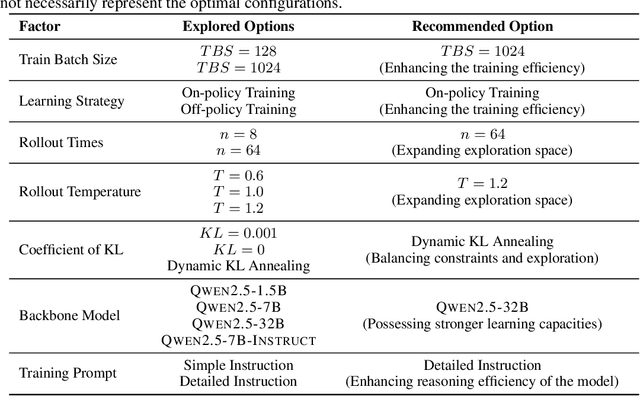
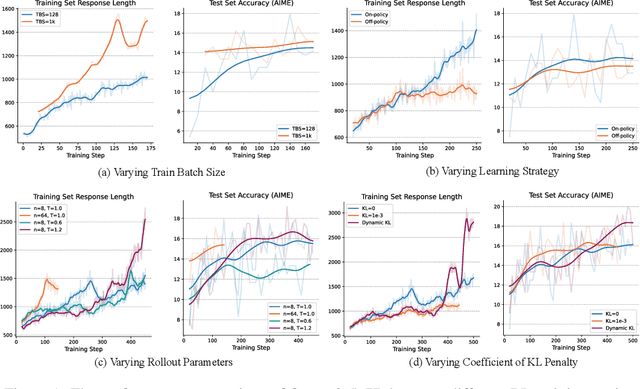
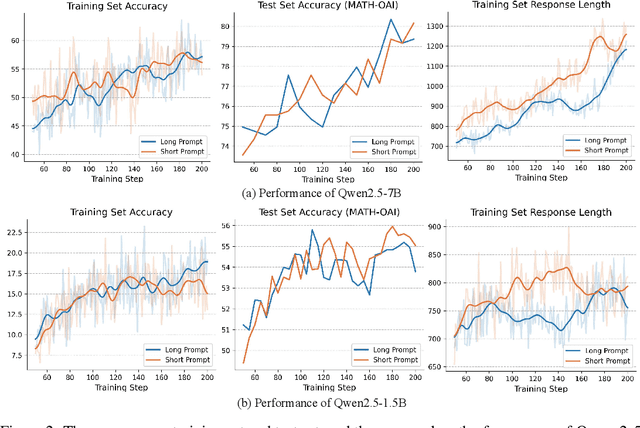
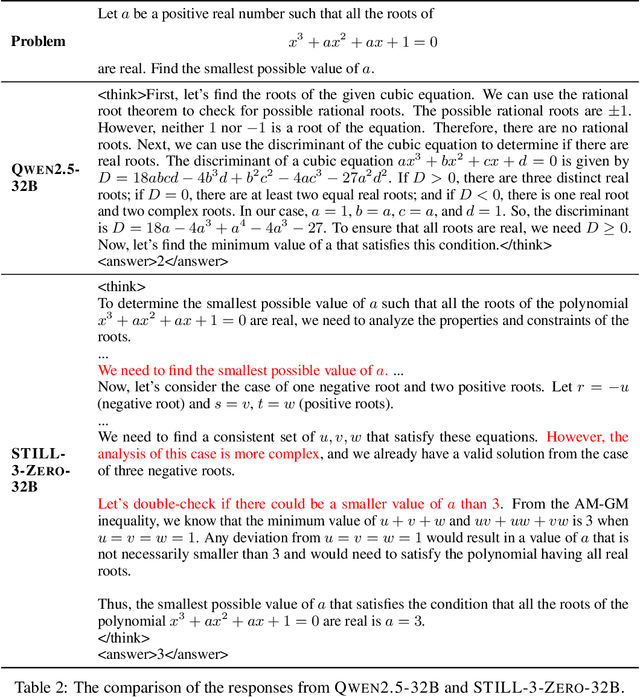
Abstract:In this report, we present the third technical report on the development of slow-thinking models as part of the STILL project. As the technical pathway becomes clearer, scaling RL training has become a central technique for implementing such reasoning models. We systematically experiment with and document the effects of various factors influencing RL training, conducting experiments on both base models and fine-tuned models. Specifically, we demonstrate that our RL training approach consistently improves the Qwen2.5-32B base models, enhancing both response length and test accuracy. Furthermore, we show that even when a model like DeepSeek-R1-Distill-Qwen-1.5B has already achieved a high performance level, it can be further refined through RL training, reaching an accuracy of 39.33% on AIME 2024. Beyond RL training, we also explore the use of tool manipulation, finding that it significantly boosts the reasoning performance of large reasoning models. This approach achieves a remarkable accuracy of 86.67% with greedy search on AIME 2024, underscoring its effectiveness in enhancing model capabilities. We release our resources at the STILL project website: https://github.com/RUCAIBox/Slow_Thinking_with_LLMs.
How to Synthesize Text Data without Model Collapse?
Dec 19, 2024

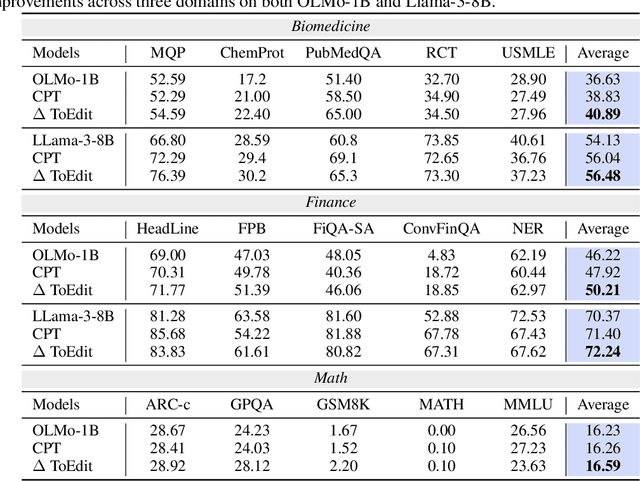
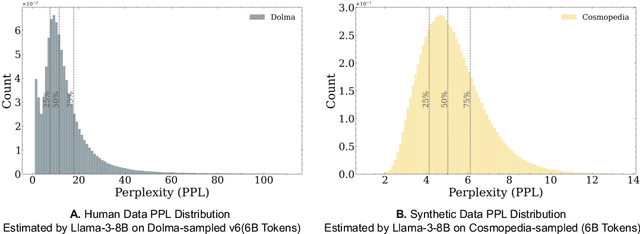
Abstract:Model collapse in synthetic data indicates that iterative training on self-generated data leads to a gradual decline in performance. With the proliferation of AI models, synthetic data will fundamentally reshape the web data ecosystem. Future GPT-$\{n\}$ models will inevitably be trained on a blend of synthetic and human-produced data. In this paper, we focus on two questions: what is the impact of synthetic data on language model training, and how to synthesize data without model collapse? We first pre-train language models across different proportions of synthetic data, revealing a negative correlation between the proportion of synthetic data and model performance. We further conduct statistical analysis on synthetic data to uncover distributional shift phenomenon and over-concentration of n-gram features. Inspired by the above findings, we propose token editing on human-produced data to obtain semi-synthetic data. As a proof of concept, we theoretically demonstrate that token-level editing can prevent model collapse, as the test error is constrained by a finite upper bound. We conduct extensive experiments on pre-training from scratch, continual pre-training, and supervised fine-tuning. The results validate our theoretical proof that token-level editing improves data quality and enhances model performance.
On Domain-Specific Post-Training for Multimodal Large Language Models
Nov 29, 2024
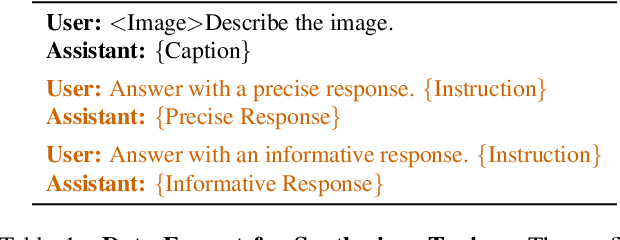
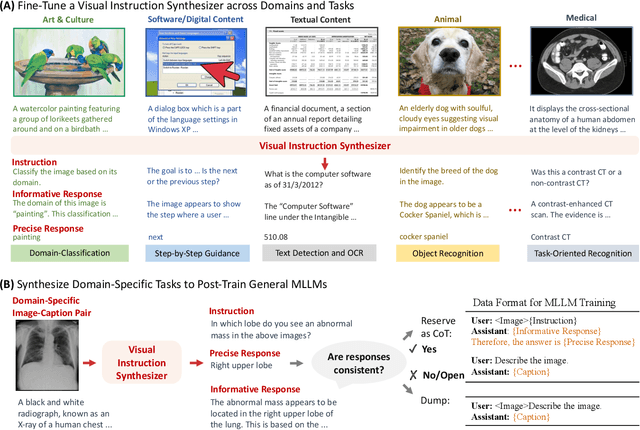

Abstract:Recent years have witnessed the rapid development of general multimodal large language models (MLLMs). However, adapting general MLLMs to specific domains, such as scientific fields and industrial applications, remains less explored. This paper systematically investigates domain adaptation of MLLMs through post-training, focusing on data synthesis, training pipelines, and task evaluation. (1) Data Synthesis: Using open-source models, we develop a visual instruction synthesizer that effectively generates diverse visual instruction tasks from domain-specific image-caption pairs. Our synthetic tasks surpass those generated by manual rules, GPT-4, and GPT-4V in enhancing the domain-specific performance of MLLMs. (2) Training Pipeline: While the two-stage training--initially on image-caption pairs followed by visual instruction tasks--is commonly adopted for developing general MLLMs, we apply a single-stage training pipeline to enhance task diversity for domain-specific post-training. (3) Task Evaluation: We conduct experiments in two domains, biomedicine and food, by post-training MLLMs of different sources and scales (e.g., Qwen2-VL-2B, LLaVA-v1.6-8B, Llama-3.2-11B), and then evaluating MLLM performance on various domain-specific tasks. To support further research in MLLM domain adaptation, we will open-source our implementations.
Instruction Pre-Training: Language Models are Supervised Multitask Learners
Jun 20, 2024Abstract:Unsupervised multitask pre-training has been the critical method behind the recent success of language models (LMs). However, supervised multitask learning still holds significant promise, as scaling it in the post-training stage trends towards better generalization. In this paper, we explore supervised multitask pre-training by proposing Instruction Pre-Training, a framework that scalably augments massive raw corpora with instruction-response pairs to pre-train LMs. The instruction-response pairs are generated by an efficient instruction synthesizer built on open-source models. In our experiments, we synthesize 200M instruction-response pairs covering 40+ task categories to verify the effectiveness of Instruction Pre-Training. In pre-training from scratch, Instruction Pre-Training not only consistently enhances pre-trained base models but also benefits more from further instruction tuning. In continual pre-training, Instruction Pre-Training enables Llama3-8B to be comparable to or even outperform Llama3-70B. Our model, code, and data are available at https://github.com/microsoft/LMOps.
Adapting Large Language Models via Reading Comprehension
Sep 18, 2023



Abstract:We explore how continued pre-training on domain-specific corpora influences large language models, revealing that training on the raw corpora endows the model with domain knowledge, but drastically hurts its prompting ability for question answering. Taken inspiration from human learning via reading comprehension--practice after reading improves the ability to answer questions based on the learned knowledge--we propose a simple method for transforming raw corpora into reading comprehension texts. Each raw text is enriched with a series of tasks related to its content. Our method, highly scalable and applicable to any pre-training corpora, consistently enhances performance across various tasks in three different domains: biomedicine, finance, and law. Notably, our 7B language model achieves competitive performance with domain-specific models of much larger scales, such as BloombergGPT-50B. Furthermore, we demonstrate that domain-specific reading comprehension texts can improve the model's performance even on general benchmarks, showing the potential to develop a general model across even more domains. Our model, code, and data will be available at https://github.com/microsoft/LMOps.
 Add to Chrome
Add to Chrome Add to Firefox
Add to Firefox Add to Edge
Add to Edge